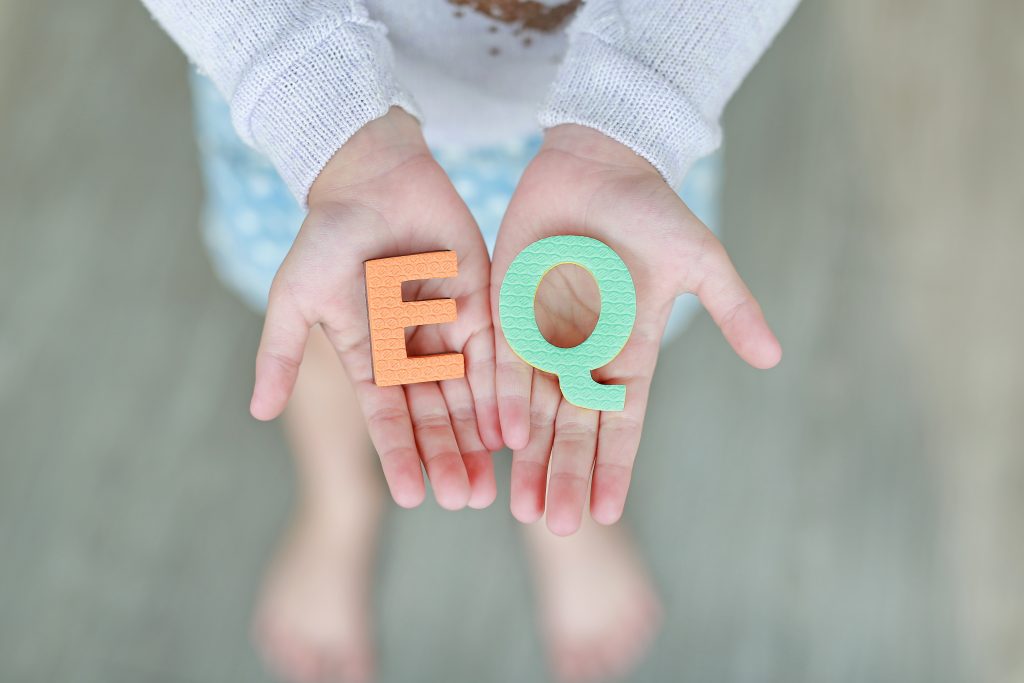Your Child’s Emotional Intelligence – A Key to Their Future Happiness & Success

We have all heard about emotional intelligence. Were you aware it can impact how happy and successful you, or your child, are? Did you know it’s not reliant on how smart you are? Or that you can nurture emotional intelligence in your child? This article explains what it is and how you can foster this valuable trait in your child(ren).
What is Emotional Intelligence?
Emotional intelligence, or EQ, is what allows you to deal with social challenges more effectively. These can range from building effective relationships to dealing with conflict, much of which children face from an early age. Someone with emotional intelligence is aware of their own feelings, shows an empathy toward others, and is able to understand and take the other’s point of view into consideration. EQ allows you to regulate your emotional and behavioral responses to situations; it’s how you can hold your temper or give rational responses during an argument.
How Does Emotional Intelligence Work?
Emotional intelligence is rooted in the amygdala, which is the emotional center of the brain governing the physiological response to stimuli. In real-life terms, it affects your thoughts, feelings, and actions, including the temporary losses of rationality that can lead you to saying or doing something you regret. As people grow and learn, their brains develop the necessary connections that make it easier to access the responses they’ve developed until they become automatic; not lashing out physically, or considering how the other person might feel in a given situation, becomes a natural step in assessing and dealing with an issue.
Why Does Emotional Intelligence Matter?
A child or adult with emotional intelligence is more likely to develop stable relationships with others and be more confident and successful. This is thanks to be being able to better manage emotionally and socially complex situations. Your child’s empathy and understanding will make them a good friend, and he’ll be less distracted as he remains calm during emotionally charged situations. They’ll have better self-esteem and be happier as they deal effectively with the conflicts that arise when working or playing with others. Research has shown an emotionally intelligent child will grow into an adult who is more responsible, productive, and caring than someone who is in less control of their reactions to outside events.
How Can You Foster Emotional Intelligence in your child?
There are some simple ways you can help your child develop their EQ. Teaching them the difference between right and wrong will help him build a sound moral framework to live by. Encouraging them to look at issues from other perspectives, asking them how they might feel in others’ situations, helps them learn empathy. They will still have negative reactions at times — most people lose their tempers at some point — but teaching our children strategies for dealing with their anger or frustration helps them retain control. Children also need to learn that sometimes people do react in emotional ways, which is normal, and this, combined with teaching them what’s appropriate in different circumstances, will help better manage their own responses.
Frustration can often arise from a deemed failure. Offering your support and encouragement when your child doesn’t succeed at a given task will help them develop resilience and the persistence they need to try again and to channel their negative response into something more positive. There are other important skills our children need, including problem solving and reasoned thinking; if they can work their way to an appropriate solution, then they can move on from the issue causing the problem.
It is vital children have the opportunity to develop social skills; playing with others will improve their communication, team-working, negotiation, and influencing skills, and give them a strong foundation on which to build their emotional intelligence. Children learn from the way those around them behave, so it’s important to model good behavior.
There is still so much to learn about emotional intelligence, but it’s easy to recognise when someone lacks it. You’re in the best position to nurture it in your child, and by doing so, give them some of the vital skills they need to become the happy, successful adult you would love for them to be.
The Peaceful Kids Program
The Peaceful Kids program can assist you in developing your children’s emotional intelligence. Peaceful Kids is a mindfulness and positive psychology-based program that builds resilience, develops emotional intelligence, lowers stress, and teaches self-calming to children.
The program provides children the skills, practice, and support to utilise coping and calming strategies that lessen the symptoms of anxiety and stress to give children lifelong skills for better mental health for long term into their teen and adult years.
For more information visit https://mayhemtomindful.com.au/peaceful-kids or https://peacefulkids.com.au
